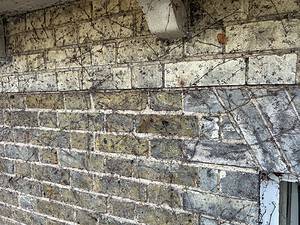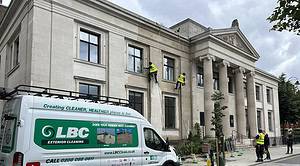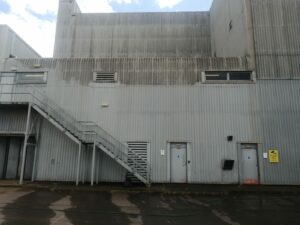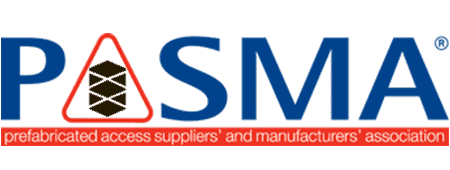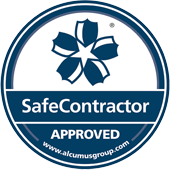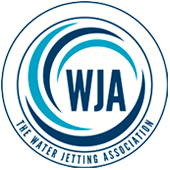Facade cleaning is an essential aspect of maintaining the aesthetics and structural integrity of a building. Over time, various factors such as pollution, weathering, and biological growth can lead to staining and deterioration of building exteriors. In this comprehensive guide, we will delve into different materials used for building facades and their maintenance requirements.
We will explore the main methods for removing dirt from various surfaces – water treatments, chemical cleaners, and abrasive techniques. Moreover, we will discuss types of staining commonly found on building exteriors along with access challenges faced during facade cleaning projects.
Furthermore, you’ll discover innovative solutions in façade cleaning like laser technology applications that are revolutionising the industry. Lastly, we’ll examine when it’s best to schedule your façade maintenance efforts as well as how collaborating with professional cleaners can ensure optimal results while preserving neighbourhood aesthetics and values.
Table of Contents:
- Different Materials for Building Facades
- Facade Cleaning Methods Overview
- Access Challenges during Facade Cleaning Projects
- Innovative Solutions in Facade Cleaning
- Timing Your Facade Maintenance Efforts
- Collaborating with Professional Cleaners
- Social Impact of Dirty Buildings
- FAQs in Relation to Facade Cleaning
- Conclusion
Different Materials for Building Facades
The exterior of buildings can be made from various materials, each with its unique properties and maintenance requirements. In this section, we will explore some common facade materials and their specific cleaning methods to ensure a well-maintained appearance without causing damage.Brick Facades and Their Maintenance Requirements
Brick is a popular choice for building exteriors due to its durability and timeless appeal. However, it can accumulate dirt, grime, moss, or algae over time. Cleaning brick surfaces typically involves using low-pressure water treatments, steam cleaning, or specialized chemical solutions designed for masonry. Facade cleaning is essential to remove dirt and maintain the building envelope.Stone Exteriors and Appropriate Cleaning Techniques
Natural stone facades such as limestone or sandstone require careful attention during the cleaning process to avoid damaging the material’s surface. Common methods include gentle pressure washing with plain water or applying non-acidic cleaners specifically formulated for stone surfaces. Removing dirt from stone facades is crucial to prevent the need for abrasive treatments that can damage the surface.Glass Surfaces and Specialized Cleaning Solutions
Glass exteriors are prevalent in modern architecture but can quickly show streaks or smudges if not cleaned regularly. Professional window cleaners often use specialized glass-cleaning agents and squeegees to achieve a streak-free finish on large-scale projects. Facade cleaning for glass surfaces is essential to maintain their transparency and clarity.Metal Cladding Upkeep Considerations
- Anodized aluminium: Use a mild detergent solution followed by rinsing with clean water.
- Powder-coated metal: Apply soapy water or a non-abrasive cleaner, then rinse with clean water.
- Soft cloth and mild detergent solution to clean the stainless steel, then rinse with fresh water.
Concrete Facade Care
Concrete exteriors can become discoloured or stained over time. To maintain their appearance, use low-pressure washing techniques or apply appropriate chemical treatments designed for concrete surfaces. Removing dirt from concrete facades is essential to prevent the need for abrasive treatments that can damage the surface. In conclusion, the different materials used in building facades require specialized maintenance and cleaning techniques to ensure they remain looking their best. With this knowledge of facade material types, we can now move on to explore various façade cleaning methods available for use.“Maintain the appearance of your building’s facade with proper cleaning techniques. From brick to glass, learn how to keep every surface looking its best. #facadecleaning #exteriorcleaning #buildingmaintenance” Click to Tweet
Facade Cleaning Methods Overview
When it comes to maintaining the exterior of your property, there are three main methods used in facade cleaning: water treatments, chemical treatments, and abrasive treatments. Each method has its advantages and drawbacks depending on the type of material being cleaned.Water Treatment Methods for Facade Cleaning
Pressure washing is a popular water-based treatment that uses high-pressure jets to remove dirt and grime from building surfaces. This environmentally friendly method is effective for most materials but may not always be suitable for stubborn stains or delicate surfaces.Chemical Treatment Options
Chemical agents can provide a deeper clean by breaking down tough stains at their source. However, they should be applied with caution as improper use can cause damage to certain materials. Always consult with professionals before using chemical cleaners.Abrasive Techniques in Facade Maintenance
- Sandblasting: An aggressive technique that involves blasting sand particles onto the surface to remove dirt and contaminants. Due to potential surface erosion, this method should only be employed when other options have been exhausted.
- Graffiti removal: Specialized abrasive techniques such as soda blasting or dry ice blasting can effectively remove graffiti without causing damage to the underlying surface.
“Revamp the exterior of your property with effective facade cleaning methods. From water treatments to abrasive techniques, trust experienced professionals for a cleaner and healthier living space. #facadecleaning #cleanliving #propertymaintenance” Click to Tweet
Types of Staining on Building Exteriors
The appearance of building facades can be significantly impacted by various types of staining, depending on factors such as regional geography and local pollution levels. Understanding the common sources of staining is essential for selecting appropriate cleaning methods to preserve your property’s exterior.Pollution-related Staining Issues
In urban settings, pollutants like car exhausts contribute greatly towards facade discoloration. Soot particles adhere to surfaces, causing a darkening effect over time. Regular facade cleaning helps combat these unsightly stains and maintain an attractive appearance.Mould & Mildew Growth Challenges
Suburban areas with limited sunlight exposure due to nearby shrubbery or trees often experience mold and mildew growth on building exteriors. These organic substances not only mar the aesthetic appeal but also pose potential health risks if left untreated. Properly timed mold removal services are crucial in addressing this issue.Other Common Sources of Staining
- Bird Droppings: Bird guano can cause stubborn stains that may require specialized treatments for effective removal.
- Rust Marks: Metal elements within a building’s structure can rust over time, leaving unsightly orange streaks across the facade.
- Lichen & Algae: Similar to mold and mildew, lichen and algae thrive in damp conditions where sunlight is scarce – regular maintenance prevents their spread across surfaces.
“Say goodbye to unsightly stains on your building’s exterior. Our professional facade cleaning services tackle pollution, mold, rust and more. Contact us now.” #facadecleaning #cleanexteriors Click to Tweet
Access Challenges during Facade Cleaning Projects
Addressing access challenges is a crucial aspect of any facade cleaning project as it determines the most suitable method and equipment to be used. In some cases, scaffolding or aerial platforms may need to be erected before work commences at height, while ground-level jobs might require specialized equipment such as pressure washers or steam cleaners.Scaffolding Setups for High-Rise Projects
In high-rise projects, scaffolding setups provide workers with secure access to elevated areas of a building’s exterior. This temporary structure allows for efficient cleaning without compromising worker safety. However, the use of scaffolding can lead to an extension in project time and a rise in costs due to setup needs and extra supplies.Aerial Platforms for Hard-to-Reach Areas
Aerial platforms, such as cherry pickers or scissor lifts, offer an alternative solution when dealing with hard-to-reach areas on a building’s facade. These versatile machines enable workers to safely reach various heights and angles without needing extensive scaffolding structures in place.Ground-Level Equipment Considerations
- Pressure Washers: For ground-level cleaning tasks, pressure washers are often employed due to their ability to remove dirt and grime effectively from various surfaces using water jets at high pressures.
- Steam Cleaners: Steam cleaners use heated water vapor instead of direct forceful spray like pressure washers, making them a more gentle option for delicate surfaces or areas with strict water usage restrictions.
“Revamp your building’s exterior with efficient and safe facade cleaning methods. From scaffolding to steam cleaners, we’ve got you covered. #ExteriorCleaning #Facadecleaning #LondonServices” Click to Tweet
Innovative Solutions in Facade Cleaning
As technology advances, new and innovative solutions emerge for maintaining building facades. One such cutting-edge technique is laser cleaning, which has proven to be particularly effective on delicate materials like limestone or marble. This non-abrasive method utilises laser light pulses instead of physical force, minimising potential harm during treatment processes while still delivering impressive results.The Science Behind Laser Cleaning Technology
Laser cleaning works by using short bursts of high-energy laser light that are directed at the surface being cleaned. The energy from the laser heats up and vaporises dirt particles without damaging the underlying material. This process is known as ablation.Benefits and Applications of Laser Facade Cleaning
- Precision: Laser cleaning allows for precise targeting of stained areas, ensuring only affected regions are treated.
- No Chemicals Required: As this method relies solely on light energy, there’s no need for potentially harmful chemicals or abrasive materials.
- Safety: Since it doesn’t involve any direct contact with surfaces, operators can work safely from a distance without risk to themselves or others nearby.
- Versatility: Apart from facade maintenance tasks, laser cleaning can also be used in various other applications like graffiti removal and restoration projects involving historic buildings.
“Revolutionize your building’s facade maintenance with laser cleaning technology. Achieve precise, chemical-free and safe results for a pristine look. #innovativecleaning #facademaintenance” Click to Tweet
Timing Your Facade Maintenance Efforts
Experts recommend scheduling full-scale cleans either in late spring or early autumn to ensure the longevity and preservation of your building’s exterior. These seasons offer optimal weather conditions for facade maintenance, as they minimize potential damage caused by freezing and thawing cycles.Benefits of Springtime Facade Maintenance
- Mild temperatures: Spring offers comfortable working conditions, allowing cleaners to work efficiently without being affected by extreme heat or cold.
- Better visibility: With longer daylight hours, cleaning crews can spot stains and dirt more easily, ensuring a thorough clean.
- Natural drying: The moderate humidity levels in spring facilitate quicker drying times for any applied treatments, reducing the risk of water damage or mold growth.
Advantages of Autumnal Cleaning
- Avoiding winter issues: By conducting facade maintenance in early autumn, you prevent ice formation on surfaces that could cause cracks and other structural problems during winter months.
- Foliage removal: Autumn is an ideal time to remove fallen leaves from gutters and downspouts, preventing blockages that may lead to water infiltration into your property’s walls.
- Pest prevention: A well-maintained exterior helps deter pests like rodents from seeking shelter within your building during colder months.
“Protect your property’s appearance and structure with regular facade cleaning. Schedule maintenance in spring or autumn for optimal results. #ExteriorCleaning #PropertyMaintenance” Click to Tweet
Collaborating with Professional Cleaners
Working closely with professional cleaners is crucial for ensuring that the most suitable method and approach are adopted for each unique building. Collaboration helps determine which techniques should be employed, taking into consideration factors such as material type, staining issues, access challenges, and regional climate conditions.Importance of Hiring Experienced Professionals
Hiring experienced professionals like LBC Exterior CLEANING ensures your building’s facade will receive proper care without causing any damage. These experts have extensive knowledge in various cleaning methods and can identify the best course of action based on your property’s specific needs. Furthermore, they possess all necessary equipment to handle even the most challenging projects safely and efficiently.Assessing Project Requirements Together
- Evaluating Material Type: Understanding the characteristics of your building’s exterior materials allows professionals to choose appropriate cleaning solutions that won’t cause harm or deterioration.
- Analyzing Staining Issues: Identifying common sources of stains enables specialists to select targeted treatments capable of effectively removing unsightly blemishes while preserving underlying surfaces.
- Determining Access Challenges: Assessing potential obstacles during initial consultations helps plan efficient strategies for reaching hard-to-access areas using scaffolding or aerial platforms if needed.
- Taking Climate Conditions into Account: Considering local weather patterns assists in scheduling maintenance efforts at optimal times throughout the year when environmental conditions pose minimal risks to both workers and structures alike.
“Collaborate with experienced professionals like LBC Exterior CLEANING to assess your building’s unique needs and develop a tailored facade cleaning plan for long-term value. #exteriorcleaning #facadecleaning #professionalcare” Click to Tweet
Social Impact of Dirty Buildings
Maintaining a clean facade plays an important role in preserving a property’s aesthetic appeal and structural integrity. A well-maintained exterior contributes positively to the surrounding community by creating pleasant living environments while also protecting property investments over time.First impressions matter – curb appeal importance
A building’s exterior is often the first thing people notice when they approach it, making curb appeal crucial for both residential and commercial properties. An attractive facade can create positive feelings towards the building, its occupants, or even an entire neighbourhood. In contrast, dirty exteriors may give off negative impressions that could affect businesses’ success or residents’ satisfaction with their living environment.Preserving neighborhood aesthetics & values
- Cleaner communities: Regular facade cleaning helps maintain a visually appealing neighbourhood that attracts visitors and potential homebuyers. This not only enhances local pride but also encourages further investment in community development projects.
- Better health: Clean buildings contribute to healthier living conditions by reducing allergens such as mold spores and pollutants from accumulating on surfaces (source). This leads to improved air quality for everyone within the vicinity.
- Increase property value: A well-maintained exterior can boost your property’s market value since buyers are more likely to invest in homes with good curb appeal (source). This, in turn, benefits the entire neighbourhood by raising overall property values.
Regular facade cleaning not only enhances curb appeal but also contributes to a cleaner community, better health, and increased property value. #ExteriorCleaning #HealthyLiving #PropertyValue Click to Tweet


